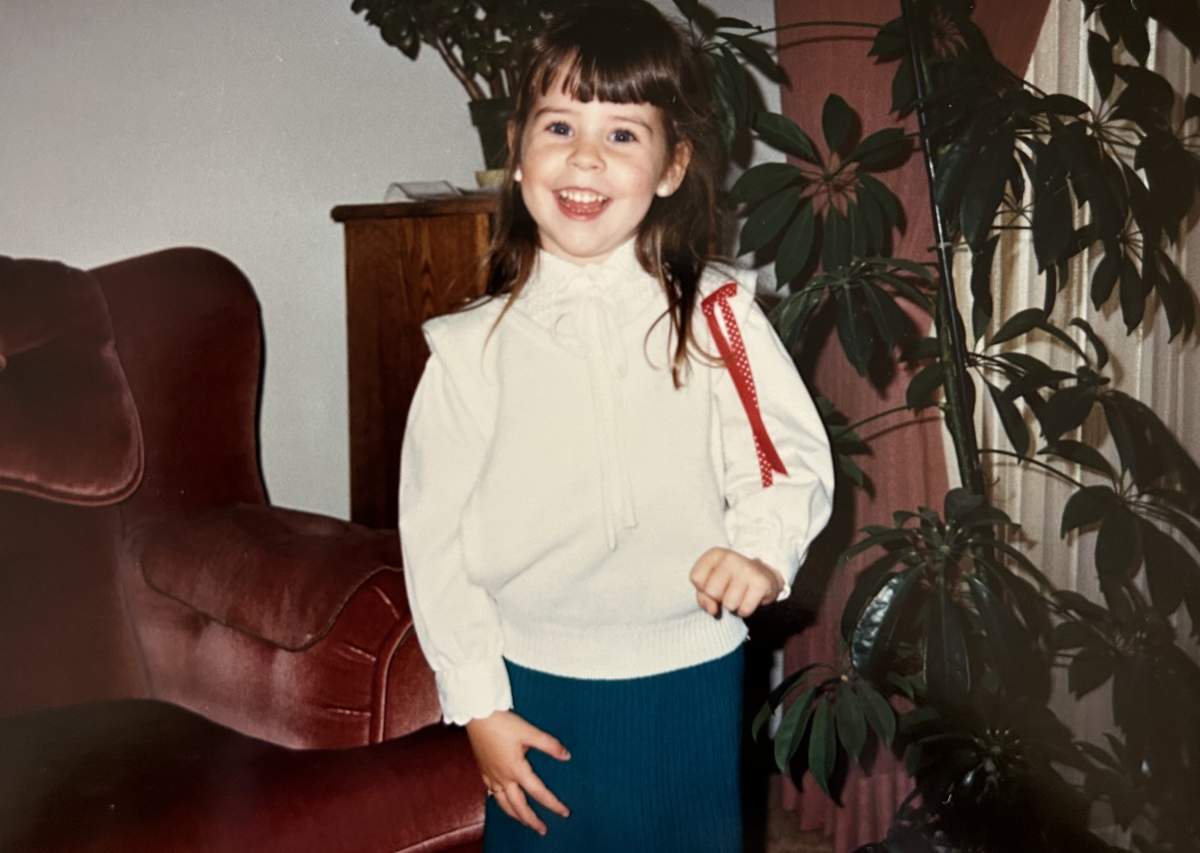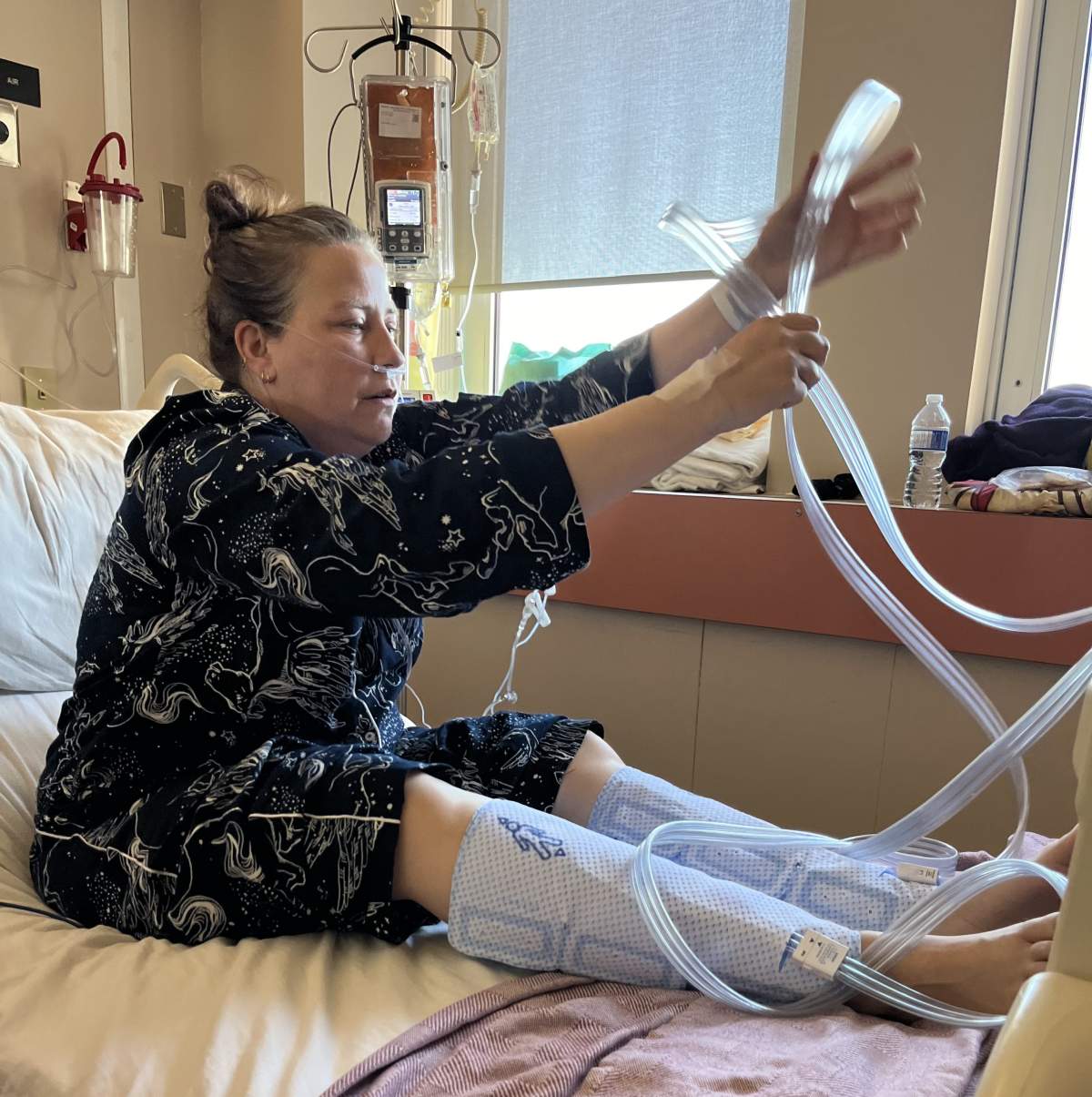Deb Surine’s life will likely end right where it started.

The 42-year-old Calgary woman has moved back to the family farm she spent much of her childhood on in Saskatchewan.
“I’m on the farm and I’m surrounded by baby animals. I couldn’t think of a better way to go out: springtime on the farm,” Surine said while tending to a flock of lambs at her aunt’s farm near Davidson.
Photos from Surine’s childhood show a happy girl enjoying life on the farm and in the mountains, but the pictures don’t tell the whole story of abuse and trauma.
It was that abuse that made Surine leave home at the age of 15. She turned to alcohol as a way to cope with her PTSD.
“It became unmanageable. I got to a point where it was going to be my life or dealing with the struggles that I had,” Surine said.
Defying the odds, Surine went on to become a Red Seal electrician and later became an instructor at SAIT in Calgary.
Her successful career and outward happiness prevented the outside world from knowing what was really going on.
“I don’t think anyone was aware of how bad my addictions had become,” Surine said.
In 2020, she made the decision to seek help.
She went to the Rockyview Hospital mental health day program for four weeks but as the end of the program neared, she realized she was still using alcohol all the time.
Health-care professionals advised her the next step was to get clean.
“It was difficult to hear that because I didn’t think that substances were my problem. I thought mental health was my problem and if I could just fix my mental health, that would fix the addiction piece too,” Surine said.
While in the rehab program at the Foothills Medical Centre, Surine remembers looking around and wondering if she really belonged there.
“I thought: ‘Everybody’s way worse off than I am. I don’t need to be here. This is not for me.'”
However, she recalls having a pivotal conversation with one of the managers on the team, who posed a critical question.
“How did I think my life was going to change if I wasn’t willing to change the way I thought or acted or anything about myself?” Surine said.

At that point, Surine was determined to seize the opportunity. She says she felt fortunate to have the chance and decided to make the most of the resources available.
She attended group therapy three times a week and was connected with the Rapid Access Addiction Medicine (RAAM) team, where she met Dr. Christine Gibson, a Calgary trauma specialist.
“She was life-changing for me. She helped me more than I can say,” Surine said.

Get weekly health news
“There are very strong connections between childhood trauma and addiction,” said Gibson in a recent interview with Global News.
She said many people who have experienced childhood trauma use drugs or alcohol to disconnect from what their brain is doing on an ongoing basis.
“It’s a solution that your brain found to help numb these intense responses,” Gibson explained. “It’s trying to protect you.”

Surine has been sober for two years and seven months now. But just as she was finally fully enjoying life for the first time, she found out she didn’t have long to live.
In January 2024, Surine was diagnosed with terminal cancer.
Instead of feeling crushed, she felt relief. She’s working through grief and dealing with death after just being able to celebrate living an addiction-free life, but she’s not bitter.
“I spent my whole life battling and I was tired of battling so to get a terminal diagnosis, it just kind of put an end to things for me. This is the one last thing I have to go through and then hopefully a lot of peace and love and serenity,” Surine said.
Surine has decided to spend her remaining time at the family farm in Saskatchewan.
“I can wake up happy every day. Happy that I’m alive that it’s another day. I get to bottle feed these cute little lambs and (take) care of the chicks and just live another day. It’s simple,” Surine said. “It’s awesome out here,” she said with a laugh.
“I’m not scared to die, but I am really, really afraid of the pain of dying from cancer.”
As she looks back at the challenges she’s encountered, Surine is not angry about getting the diagnosis at this point in her life. Instead, there is a feeling of acceptance.
“I don’t know what the afterlife is like, and I don’t know where I’m going to go, but I lost my brother 20 years ago and I’d like to think I get to see him when this is all over. There’s things that I kind of look forward to in the afterlife. This life was good,” she pauses.
“Well, no, this life was hard. I’ve got one last fight ahead of me and hopefully then it’s not hard anymore,” Surine said.
During January and February, Surine was in the Foothills Medical Centre receiving chemotherapy. She describes her pain at that time as unbearable.
“I was really sick and the medical professionals said they could handle my pain. That just wasn’t really the case for me. I was in a huge amount of pain and I spent three weeks in the hospital in excruciating pain with them trying to figure out how to stop it.”
Surine made the decision to end her life and was scheduled to receive medical assistance in dying on April 30.
“I thought: ‘If this is the rest of my days, I can’t carry on.’ However, as April went on, I started feeling a little bit better, so the April 30 date was coming up. I called and I changed it to May 30 preemptively because I thought if that pain that sent me to the hospital for those three weeks came back, that it was still in my back pocket,” Surine said.
She said as long as the pain is managed “then it is what it is” and she wants to live her life doing what makes her happy on the farm, like tending to the chicks.

One thing about her journey that Surine wants people to be aware of is that there was a difference in the response from people when she was struggling with addiction disorder compared to her cancer diagnosis.
“When I got cancer, probably every person I’ve ever met in my whole life had contacted me and told me how sorry they were and that they wanted to help in any way that they can,” Surine said.
While she’s grateful for the support, she says it was the trauma and battle with addictions — not the cancer — that’s been the hardest part of her life.
“I would want people to view mental health addictions in the same way they view cancer. It’s just as debilitating.”
“There’s a whole lot of stigma around that. Nobody looked at me like I was sick or like I was struggling, that I needed help, and now people know that I’m sick and I’m struggling and I need help,” Surine said.
Gibson said there’s a huge stigma still attached to addiction and mental health.
“I like to say to folks that if you were dealing with substance use, it’s the same as if you were diagnosed with diabetes. This is not something that was necessarily your choice or your control in the way that a lot of people want to believe.”
Gibson said there is a lack of understanding about the link between substance use and trauma.
“I think people would view it in quite a different way if they were able to make that link better,” Gibson said. “I would hope that people would be a lot more compassionate towards folks who are dealing with addiction if they really understood the mechanism of how it happens.”

After Surine got out of rehabilitation, once a month she would go downtown in Calgary to offer meals and chat with folks who looked like they needed help.
“If you actually listen to their stories, they are devastating. I think if we had more compassion and more human one-to-one where you actually were able to talk to these people and listen to their stories, we wouldn’t marginalize them,” Surine said.
Looking back at her four decades of life, she hopes that if there is anything people can learn from her story it is to have compassion for others.
“It’s a complex issue and people don’t understand mental health and when we don’t understand something, it’s easy to blame that person.
“If I could choose not to drink or use drugs, I would’ve done that. It would’ve made my life a lot easier, but it wasn’t a choice. It was an engrained coping skill to deal with the fight-or-flight system that is constantly going off all day in my body, and it gave me some time to have a rest from that. It’s exhausting being in that state of mind all day every day,” Surine said.
“If you get cancer, the public understands that. With mental health, it’s so much more complex.”
Surine plans to give her possessions to the Women in Need Society and she’s raising money for Mustard Seed in Calgary to help others who are struggling. A fundraiser has been set up to allow for that last wish.
“I could have been that person. I never ended up homeless. Thank you, universe. But I was one step away from being there,” Surine said.
She says despite knowing she will likely not live to see the end of this year, these are the best days of her life.
“I don’t need to go on fancy vacations or have a ton of money. This is what makes me happy,” Surine said. “I’m honoured that I get to do this until the end of my life.”







Comments